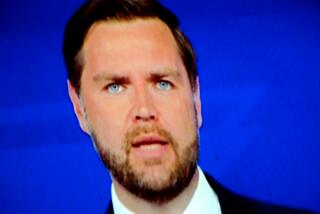Debate Format Is Right When Decision Is a Draw
- Share via
WASHINGTON — The League of Women Voters’ decision to withdraw sponsorship of the second George Bush-Michael S. Dukakis debate because neither campaign would agree to the league’s desire for more “risk” is sure to prompt a debate about debates.
Should debates be more confrontational, less contrived? Should the candidates’ veto power over journalists be ended? Now that the parties and campaigns are sponsoring the debates, should we do away with them?
On all points, the answer is no.
The 1988 debate format, with both parties and campaigns involved in the structure of debates and the selection of journalists for the panel, is a good development. The potential for debates to distort the course of an election has been diminished while the ability of the candidates to project what they--as opposed to a panel of journalists--believe is important for the voters has been strengthened.
The history of modern presidential debates is brief. It begins with the 1960 Richard M. Nixon-John F. Kennedy contest. There Nixon was on unequal ground because of inadequate makeup and his tendency to perspire under TV lights--a fact CBS caught with its cameras, to Nixon’s detriment.
Every campaign manager since has tried to consider a televised debate not only in terms of what is said by and between the candidates--issues and exchanges--but also how the candidates come across on television. Until now, the right formula has been elusive.
No serious observer can say that the 1976 Gerald R. Ford-Jimmy Carter debate was fair. A Ford gaffe, and the speed with which it was ridiculed by a journalist in a follow-up comment, may have cost him the election. Anyone who defends the proposition that the outcome of a presidential election should hinge on one mistake is no friend of the political process.
Carter himself would not be likely to agree with the League of Women Voters that debates need more “risk” to be valid. His campaign was wounded by Ronald Reagan’s one-liner in 1980. We should see debates for what they are: The only chance voters have to get a close-up look at those who might be President, unfiltered by the media or advertising agencies.
Television’s magic is its intimacy. It brings the candidates into our living rooms. Yet the only access candidates have to television is what is given them in news coverage and interviews, or what is sold to them for commercials.
Debates are the exception. Here the voters can see both candidates for 90 minutes, measuring them by words as well as body language, facial expressions and their reactions to one another. As the first Bush-Dukakis debate and Wednesday’s Dan Quayle-Lloyd Bentsen session showed, even in a controlled format two candidates can--and do--directly engage one another.
That no clear “winner” emerged from the presidential debate is proof we are on to the right formula. The benefits of debates are that they expose the candidates--not make them vulnerable. The 1988 debates give us something to think about--not a climactic event that makes up our minds.
Journalists are still free to follow up on debates, as they did for almost a week after the Bush-Dukakis exchange. The fact that both Bush and Dukakis scurried to clarify statements on abortion and the American Civil Liberties Union shows that journalists still have plenty of power to expand and explain.
What the new debates do is give the candidates a chance to project what they want seen and heard. There is plenty of room for them to engage one another without a “McLaughlin Group”-style shouting match. By holding more than one debate, the odds against a poor performance or gaffe dictating the election’s outcome are diminished--and that’s good too.
The League of Women Voters made a mistake in withdrawing sponsorship. To me, risk equates with sensationalism; a risky debate may make entertaining television but it’s not the way to elect a President.
It’s a healthy sign when the debates give us so much to think about we can’t decide who won or lost. That’s a matter better left till Nov. 8.
More to Read
Get the L.A. Times Politics newsletter
Deeply reported insights into legislation, politics and policy from Sacramento, Washington and beyond. In your inbox twice per week.
You may occasionally receive promotional content from the Los Angeles Times.










